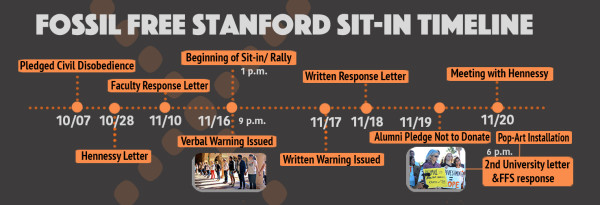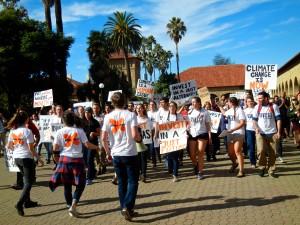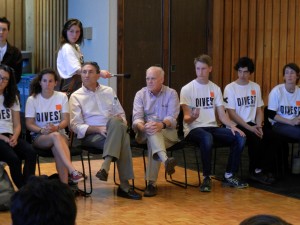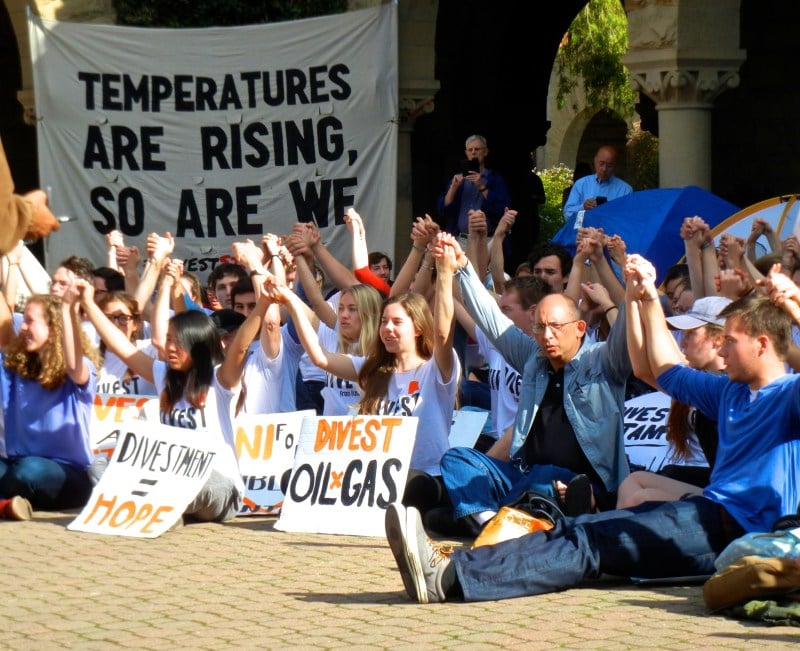After a five-day sit-in starting on Monday, student protesters concluded their occupation of the Main Quad Friday morning by holding a rally for full divestment from fossil fuels. Later in the day, students met with President John Hennessy to discuss their cause.

The night before the rally, organized by Fossil Free Stanford (FFS), the participants had received another warning from the University, this time with a more clear timeline for punishment as well as an extended threat to suspend investment requests currently in the process of being reviewed.
University-FFS exchanges
On Thursday night, the administration delivered another notice to sit-in participants, many of whom were members of Fossil Free Stanford. Following up on the previous warning, the second letter outlined that if the protesters were not gone by 5 p.m. on Friday, they would be issued Fundamental Standard charges.
The letter clarified previous statements about Hennessy’s willingness to meet with protesters, saying that he will only meet with sit-in participants “on the condition that Fossil Free members are not continuing to act in violation of the university policies in regard to the Main Quad.”
The University’s message concluded with a warning that the University “is considering suspending Fossil Free’s request to APIRL [Advisory Panel on Investment Responsibility and Licensing] until they are in compliance with University policies.” The APIRL “advises and makes recommendations to the Office of the President on issues related to socially responsible investing,” which would include evaluating student proposals such as fossil fuel divestment.
Similar to the exchange between the administration and FFS participants earlier this week, participants in the sit-in released an Op-Ed letter in response to the University’s. After summarizing what they view as the success of the sit-in (375 students at the opening rally, 80-100 students camping out around the clock, over 30 faculty led teach-ins and 30 alumni joining the protest and announcing the withholding of donations to the University), the FFS letter heavily criticized the University’s threat to suspend APIRL processes.
According to the response letter, by not processing APIRL requests, the University would not be punishing the students for breaking the Main Quad Policy but rather “condemning all of the people on the front lines of climate change and pollution, who face injustices perpetuated by the oil and gas industry everyday.”
“If we will have earned a charge under the Fundamental Standard at 5 p.m., we have earned it already,” the letter said. “Come charge us at 11 a.m. in our encampment. We are not just Fossil Free Stanford. We are Stanford. And we are not going away.”
Concluding rally
On Friday morning, sit-in participants woke early to prepare for a concluding rally and potential Fundamental Standard charges, which the University ultimately did not press.

A half hour before the rally began, Stanford members of two workers’ groups — Service Employees International Union (SEIU) Local 2007 and the janitorial group DTZ — joined sit-in participants for a pizza lunch provided by SEIU. Francisco Preciado, the executive director of SEIU, emphasized the need for students and workers to join in solidarity on causes of social justice.
“We’re asking for your support to raise the standards for wages, for just and socioeconomic research related to health,” Preciado said to a crowd of staff and students. “We’re here to support you in this just cause, and we hope you come to support us in our just cause as well.”
When 11 a.m. rolled around, no students had been charged with violations, and the closing events proceeded in the Main Quad uninterrupted. Rebecca Behrens ’19 opened the rally by saying that although Stanford has not committed to divest from fossil fuels, FFS was ending their sit-in “in victory.”
“I felt ignored, frustrated and hopeless, because of the apathy that Stanford showed,”Behrens said. “Yet every day… I was inspired and uplifted by all of you.”
“[The administration] cannot ignore us when we made international headlines as we did all this week,” she added. “This week, we showed the world that our voices do matter… We showed the world that we can win.”
A medley of speeches and performances followed. Four students detailed personal encounters with consequences of the fossil fuel industry — from environmental degradation in Alaska to conflict in the Middle East. Fossil Free’s a cappella group sang an original song calling for climate change action.
Pedro Martins ’19 and Sadie Cwikiel ’19 took the microphone to acknowledge the many campus groups — students, faculty, alumni and staff — that have supported the sit-in, contrasting these groups’ solidarity with the University’s response.
Cwikiel then explained FFS’s decision to end their sit-in at 11 a.m. and said that FFS hoped all participants would attend the Transgender Day of Remembrance event occurring in White Plaza at noon.
At that point, members of FFS stepped in to announce that they had just confirmed a 2 p.m. meeting with Hennessy, open to all.
Finally, after a performance by the a cappella group Talisman, Behrens affirmed that although the sit-in was ending, FFS “will continue to escalate and take direct action until the University divests fully from fossil fuels.”
The sit-in closed the same way that it began — students holding hands and singing.
Meeting with Hennessy
The meeting with Hennessy was held in the Oak Lounge in Tresidder Union, where administrators had to pull up additional chairs to seat more students. Despite this measure, many students had to remain standing in the crowd of around 100.
The meeting opened with FFS leader Yari Greaney ’15 M.S.’16 summarizing the five day long sit-in. Greaney stressed the real-world negative impacts of climate change and fossil fuels.

Hennessy, who sat in the circle with his senior assistant Jeff Wachtel, said that while he agreed on the facts of climate change, that didn’t change the fact that not everyone on the Board of Trustees supports divestment. According to Hennessy, the Board has a very specific process for investment decisions that requires significant amounts of time and research.
“Quite frankly if I asked SCIR [Board of Trustees’ Special Committee on Investment Responsibility] on to do divestment, they would say no,” Hennessy said. “I will tell you completely honestly [complete fossil fuel divestment] has no chance of passing because it has no background research.”
The issues of the Board processes and the research necessary for action became two of the central topics of discussion. According to the FFS leaders, the research required has already been done by outside parties around the world, including the International Panel on Climate Change (IPCC), and the Board has access to this information.
“We aren’t going to fudge these numbers — we are here because of those numbers,” said Josh Lappen ’17.
While Hennessy said that the Board would move as fast as possible while still being “deliberate,” he also stressed how far Stanford has come by divesting from coal.
ASSU President John-Lancaster Finley ’16, who was present at the meeting but did not participate in the sit-in, said that while divesting from coal had made Stanford a leader, the community shouldn’t stop at just coal.
“We really need to show that Stanford can lead on this, and Stanford should lead on it again,” Finley said.
Finley also emphasized that he was representing not just his own views, but the views of the student body that has voted in favor of full divestment.
At this point, Wachtel also entered the conversation, stressing that the University has other obligations and has to consider future divestment campaigns as well.
“Given the commitment you made to sitting around, it would in some ways be easier for us to divest,” Wachtel said. “But rather than taking the politically easy route and making everybody here feel happy about it, we are thinking about the long term.”
Beginning to wrap up the meeting, Lappen and fellow student leader Sijo Smith ’18 reiterated that FFS was requesting a commitment from Hennessy and the Board to use and publicize criteria based on scientific research.
With no real change as a result of the meeting, Greaney concluded the student input, telling Hennessy that Fossil Free “will still be here and will continue calling for full divestment.”
“I admire your conviction, but there can still be a disagreement on whether or not divestment is the solution,” Hennessy responded.
Correction: A previous version of this article listed Sadie Cwikiel as Sadie Cwikly. The Daily regrets this error.
Editor’s Note: Ada Throckmorton was an embedded reporter at the sit-in.
Contact Ada Throckmorton at adastat ‘at’ stanford.edu and Hannah Knowles at hknowles ‘at’ stanford.edu.
